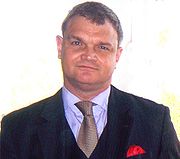
Kevin Brown (historian)
Encyclopedia

Paddington
Paddington is a district within the City of Westminster, in central London, England. Formerly a metropolitan borough, it was integrated with Westminster and Greater London in 1965...
, London
London
London is the capital city of :England and the :United Kingdom, the largest metropolitan area in the United Kingdom, and the largest urban zone in the European Union by most measures. Located on the River Thames, London has been a major settlement for two millennia, its history going back to its...
, England
England
England is a country that is part of the United Kingdom. It shares land borders with Scotland to the north and Wales to the west; the Irish Sea is to the north west, the Celtic Sea to the south west, with the North Sea to the east and the English Channel to the south separating it from continental...
, in 1989 and having established the museum in 1993.
Brown was educated at Hertford College, Oxford
University of Oxford
The University of Oxford is a university located in Oxford, United Kingdom. It is the second-oldest surviving university in the world and the oldest in the English-speaking world. Although its exact date of foundation is unclear, there is evidence of teaching as far back as 1096...
and at University College London
University College London
University College London is a public research university located in London, United Kingdom and the oldest and largest constituent college of the federal University of London...
. He is a professional archivist and museum curator specialising in the history of medicine and has lectured widely. In 2001, he was the first historian and first non-scientist to deliver the Andrew J. Moyer
Andrew J. Moyer
Andrew Jackson Moyer was an American microbiologist who is known mainly for his work on the development of industrial production methods for various microorganisms...
Lecture at the United States Department of Agriculture National Center for Agricultural Utilization Research
National Center for Agricultural Utilization Research
The National Center for Agricultural Utilization Research is an United States Department of Agriculture laboratory center in Peoria, Illinois...
at Peoria, Illinois
Peoria, Illinois
Peoria is the largest city on the Illinois River and the county seat of Peoria County, Illinois, in the United States. It is named after the Peoria tribe. As of the 2010 census, the city was the seventh-most populated in Illinois, with a population of 115,007, and is the third-most populated...
. He was Chairman of the London Museums of Health & Medicine
The London Museums of Health & Medicine
The London Museums of Health & Medicine is an organization that brings together some of the activities of some of the museums in London related to health and medicine...
from 2001 to 2004. He is an authority on Alexander Fleming
Alexander Fleming
Sir Alexander Fleming was a Scottish biologist and pharmacologist. He wrote many articles on bacteriology, immunology, and chemotherapy...
and the history of penicillin
Penicillin
Penicillin is a group of antibiotics derived from Penicillium fungi. They include penicillin G, procaine penicillin, benzathine penicillin, and penicillin V....
.
Brown's 2004 biography of Alexander Fleming, Penicillin Man: Alexander Fleming and the Antibiotic Revolution tells the story of the discovery of penicillin
Discovery of penicillin
Alexander Fleming was the first to suggest that the Penicillium mould must secrete an antibacterial substance, and the first to isolate the active substance which he named penicillin, but he was not the first to use its properties...
and of the great scientist who made that breakthrough. He has also written a history of syphilis
Syphilis
Syphilis is a sexually transmitted infection caused by the spirochete bacterium Treponema pallidum subspecies pallidum. The primary route of transmission is through sexual contact; however, it may also be transmitted from mother to fetus during pregnancy or at birth, resulting in congenital syphilis...
, The Pox: the Life and Near Death of a Very Social Disease in 2006 and has written a study of health, war and military and civilian medicine in the 20th century, published as Fighting Fit: Health Medicine and War in the Twentieth Century in 2008. He has since turned his attention to the history of maritime medicine with Poxed and Scurvied: The Story of Sickness and Health at Sea published in 2011.

